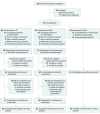The Unified Protocol for Transdiagnostic Treatment of Emotional Disorders Compared With Diagnosis-Specific Protocols for Anxiety Disorders: A Randomized Clinical Trial
- PMID: 28768327
- PMCID: PMC5710228
- DOI: 10.1001/jamapsychiatry.2017.2164
The Unified Protocol for Transdiagnostic Treatment of Emotional Disorders Compared With Diagnosis-Specific Protocols for Anxiety Disorders: A Randomized Clinical Trial
Abstract
Importance: Transdiagnostic interventions have been developed to address barriers to the dissemination of evidence-based psychological treatments, but only a few preliminary studies have compared these approaches with existing evidence-based psychological treatments.
Objective: To determine whether the Unified Protocol for Transdiagnostic Treatment of Emotional Disorders (UP) is at least as efficacious as single-disorder protocols (SDPs) in the treatment of anxiety disorders.
Design, setting, and participants: From June 23, 2011, to March 5, 2015, a total of 223 patients at an outpatient treatment center with a principal diagnosis of panic disorder with or without agoraphobia, generalized anxiety disorder, obsessive-compulsive disorder, or social anxiety disorder were randomly assigned by principal diagnosis to the UP, an SDP, or a waitlist control condition. Patients received up to 16 sessions of the UP or an SDP for 16 to 21 weeks. Outcomes were assessed at baseline, after treatment, and at 6-month follow-up. Analysis in this equivalence trial was based on intention to treat.
Interventions: The UP or SDPs.
Main outcomes and measures: Blinded evaluations of principal diagnosis clinical severity rating were used to evaluate an a priori hypothesis of equivalence between the UP and SDPs.
Results: Among the 223 patients (124 women and 99 men; mean [SD] age, 31.1 [11.0] years), 88 were randomized to receive the UP, 91 to receive an SDP, and 44 to the waitlist control condition. Patients were more likely to complete treatment with the UP than with SDPs (odds ratio, 3.11; 95% CI, 1.44-6.74). Both the UP (Cohen d, -0.93; 95% CI, -1.29 to -0.57) and SDPs (Cohen d, -1.08; 95% CI, -1.43 to -0.73) were superior to the waitlist control condition at acute outcome. Reductions in clinical severity rating from baseline to the end of treatment (β, 0.25; 95% CI, -0.26 to 0.75) and from baseline to the 6-month follow-up (β, 0.16; 95% CI, -0.39 to 0.70) indicated statistical equivalence between the UP and SDPs.
Conclusions and relevance: The UP produces symptom reduction equivalent to criterion standard evidence-based psychological treatments for anxiety disorders with less attrition. Thus, it may be possible to use 1 protocol instead of multiple SDPs to more efficiently treat the most commonly occurring anxiety and depressive disorders.
Trial registration: clinicaltrials.gov Identifier: NCT01243606.
Conflict of interest statement
Figures


Comment in
-
Transdiagnostic Cognitive Behavioral Therapy and the Return of the Repressed.JAMA Psychiatry. 2017 Sep 1;74(9):867-868. doi: 10.1001/jamapsychiatry.2017.1982. JAMA Psychiatry. 2017. PMID: 28768336 No abstract available.
-
Equivalence? Clarifications Required.JAMA Psychiatry. 2018 Jan 1;75(1):103. doi: 10.1001/jamapsychiatry.2017.3713. JAMA Psychiatry. 2018. PMID: 29214281 No abstract available.
-
Equivalence? Clarifications Required-Reply.JAMA Psychiatry. 2018 Jan 1;75(1):103-104. doi: 10.1001/jamapsychiatry.2017.3500. JAMA Psychiatry. 2018. PMID: 29214283 No abstract available.
References
-
- Barlow DH, Bullis JR, Comer JS, Ametaj AA. Evidence-based psychological treatments: an update and a way forward. Annu Rev Clin Psychol. 2013;9:1-27. - PubMed
-
- Wang PS, Lane M, Olfson M, Pincus HA, Wells KB, Kessler RC. Twelve-month use of mental health services in the United States: results from the National Comorbidity Survey Replication. Arch Gen Psychiatry. 2005;62(6):629-640. - PubMed
-
- Weissman MM, Verdeli H, Gameroff MJ, et al. . National survey of psychotherapy training in psychiatry, psychology, and social work. Arch Gen Psychiatry. 2006;63(8):925-934. - PubMed
-
- Kazdin AE. Evidence-based treatment and practice: new opportunities to bridge clinical research and practice, enhance the knowledge base, and improve patient care. Am Psychol. 2008;63(3):146-159. - PubMed
-
- McHugh RK, Barlow DH. The dissemination and implementation of evidence-based psychological treatments: a review of current efforts. Am Psychol. 2010;65(2):73-84. - PubMed
Publication types
MeSH terms
Associated data
Grants and funding
LinkOut - more resources
Full Text Sources
Other Literature Sources
Medical

